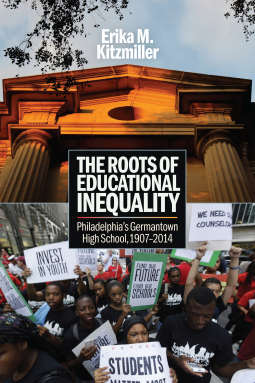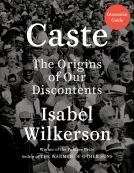
The Roots of Educational Inequality
Philadelphia's Germantown High School, 1907-2014
by Erika M. Kitzmiller
This title was previously available on NetGalley and is now archived.
Send NetGalley books directly to your Kindle or Kindle app
1
To read on a Kindle or Kindle app, please add kindle@netgalley.com as an approved email address to receive files in your Amazon account. Click here for step-by-step instructions.
2
Also find your Kindle email address within your Amazon account, and enter it here.
Pub Date Dec 03 2021 | Archive Date Dec 03 2021
Talking about this book? Use #TheRootsofEducationalInequality #NetGalley. More hashtag tips!
Description
The Roots of Educational Inequality chronicles the transformation of one American high school over the course of the twentieth century to explore the larger political, economic, and social factors that have contributed to the escalation of educational inequality in modern America.
In 1914, when Germantown High School officially opened, Martin G. Brumbaugh, the superintendent of the School District of Philadelphia, told residents that they had one of the finest high schools in the nation. Located in a suburban neighborhood in Philadelphia's northwest corner, the school provided Germantown youth with a first-rate education and the necessary credentials to secure a prosperous future. In 2013, almost a century later, William Hite, the city's superintendent, announced that Germantown High was one of thirty-seven schools slated for closure due to low academic achievement. How is it that the school, like so many others that serve low-income students of color, transformed in this way?
Erika M. Kitzmiller links the saga of a single high school to the history of its local community, its city, and the nation. Through a fresh, longitudinal examination that combines deep archival research and spatial analysis, Kitzmiller challenges conventional declension narratives that suggest American high schools have moved steadily from pillars of success to institutions of failures. Instead, this work demonstrates that educational inequality has been embedded in our nation's urban high schools since their founding. The book argues that urban schools were never funded adequately. Since the beginning of the twentieth century, urban school districts lacked the tax revenues needed to operate their schools. Rather than raising taxes, these school districts relied on private philanthropy from families and communities to subsidize a lack of government aid. Over time, this philanthropy disappeared leaving urban schools with inadequate funds and exacerbating the level of educational inequality.
Advance Praise
“In The Roots of Educational Inequality, Erika M. Kitzmiller provides a clear and meticulously researched inquiry into the racial and economic inequality which has plagued America’s public high schools for over a hundred years. In her groundbreaking study, Kitzmiller brilliantly utilizes both ethnographic and quantitative methods to expose ‘how these institutions were founded to provide different opportunities and resources to Black and white children.’ Readable and thought-provoking, this volume is of interest not only to educational specialists but to everyone who cares about equality in public education.”
—Henry Louis Gates, Jr., Harvard University
Available Editions
| EDITION | Other Format |
| ISBN | 9780812253566 |
| PRICE | $45.00 (USD) |
Featured Reviews
I had originally requested this book under a different pretense, but I'm thrilled that I kept reading even when it did not match my initial conception of what this book might be. As somebody in a 'third world country' I feel that educational inequality is as common as day and night and so to see it playing out in a case of one particular School as selected by the author provides for an interesting read. History teaches us important lessons in this book and it is my hope that many other such topnotch scholars like the author of this book will undertake such microcosmic studies and present an in depth picture. The public school system needs overhaul, yes it absolutely does. A weak public education system is sure shot way to corrosion of society, some affects of which, we are already seeing.
This is a strong recommend for anyone looking to understand the importance and manner of conducting such a study, apart from the all important topic that it deals with.
Educational inequality is not new nor is it extinct in public education. Kitzmiller’s historical view of Germantown High School in Philadelphia, PA was an eye-opener. Inequalities were present from almost the beginning and plagued this educational institution to its closing days. Racial and economic inequality play a key role in the educational system for these Philadelphia residents. Of particular interest was the differing accounts of the students’ experiences. There were such varying accounts of events for students attending during the same timeframe. The experiences for minority students were quite different from the experiences of white students. While there were many student accounts in the book, there were not many accounts from faculty members. I wonder if the educators from Germantown were even aware of how their practices impacted students.
This book should be essential reading for all educational administrators in the K-12 system. As we grapple with educational inequalities in the US, there are lessons to be learned from this book.
 Stacy S, Reviewer
Stacy S, Reviewer
A great look at Germantown High School- the beginning and how it got here. Philadelphia is not known for currently having good schools. It’s interesting to see the roots of how we got where we are. It’s good to know there are people trying to change the issues and be what the students need.
This book was rather hard to get through. I found the subject interesting and important as public education is still vastly unequal and separated by gender, race, and class. However, the book was rather stale with all the quantitative information. I found the qualitative aspect really enjoyable to read. Actually hearing the stories of students in Philadelphia from decades ago until now was the part of the book worth reading.
 Ryan M, Educator
Ryan M, Educator
A really interesting account about how constant underfunding of public education combined with racial fears to create segregated and exceedingly unequal schools. The basic spoiler is that white schools had a larger parent and alumni base to rely on for charitable donations, making the underfunding of these schools seem a non-issue. When the schools began to become more integrated, racial fears led to some of those families abandoning the schools and certainly a good deal of racism in the schools themselves, but the Great Depression and World War II really ate into charitable donations to schools. Without the donations, these formerly excellent schools fell into disrepair, so those who could abandoned them for highly selective schools, private schools, or for suburban schools with a higher tax base. This left them to be underfunded and largely poor and segregated once again. This led to the push to have school choice and the proliferation of for-profit charter schools that impoverish schools further, most without producing better results for students.
Serving as a backdrop to this general story is the story of Germantown High School. The book deftly weaves the history of this one specific school into the overarching story, telling individual stories of students and staff in an effective manner. It's a good deep dive into this time period of public school education history.
A great insight into how lack of funding and misguided political/social efforts led to the demise of one school in Philadelphia and how this can be used to view the US educational system as a whole. It exposed how the government actually fails to fulfill its promises when it comes to urban school districts as they have evolved over the decades, with huge income-class and racial disparities. Kitzmiller did a lot of important research that she translated well and this was a relatively easy book to read, albeit the subject matter being tough.
Erika M. Kitzmiller’s "The Roots of Educational Inequality" provides a compelling and meticulously researched exploration into the long-standing issue of educational disparity in the United States, as illustrated through the history of Germantown High School in Philadelphia. From its grand opening in 1914 to its closure in 2013, Germantown High's evolution mirrors the broader trajectory of American public education, reflecting shifts in political, economic, and social landscapes.
The book’s narrative begins in the early 20th century when Germantown High was heralded as one of the nation's finest. At that time, it was a beacon of educational excellence in a prosperous suburban neighborhood. However, by 2013, the school faced closure due to persistently low academic achievement. Kitzmiller's longitudinal study reveals that this decline was not an isolated incident but part of a systemic issue embedded in the fabric of urban education.
Kitzmiller's research is notable for its depth and breadth, combining archival research with spatial analysis to challenge the narrative that American high schools have universally deteriorated over time. Instead, she argues that the roots of educational inequality were established early on. Her analysis shows that urban schools like Germantown High were chronically underfunded from the start, relying on private philanthropy rather than sustained public support. As the years passed and economic conditions changed, charitable donations waned, exacerbating the disparities.
The book is both illuminating and sobering, providing a nuanced understanding of how educational inequities have been perpetuated by inadequate funding and systemic neglect. The narrative is enriched by personal stories of students and staff, which vividly illustrate the human impact of these broader trends. For those looking to gain a deeper insight into the systemic issues that shape our educational institutions and how they have evolved over time, this is a great resource.
Thank you to the publishers and NetGalley for the opportunity to review a temporary digital ARC in exchange for an unbiased review.
Readers who liked this book also liked:
Patti Callahan Henry
General Fiction (Adult), Historical Fiction, Women's Fiction
Riki Wilchins, Clare Howell
Biographies & Memoirs, LGBTQIAP+, Parenting & Families


















